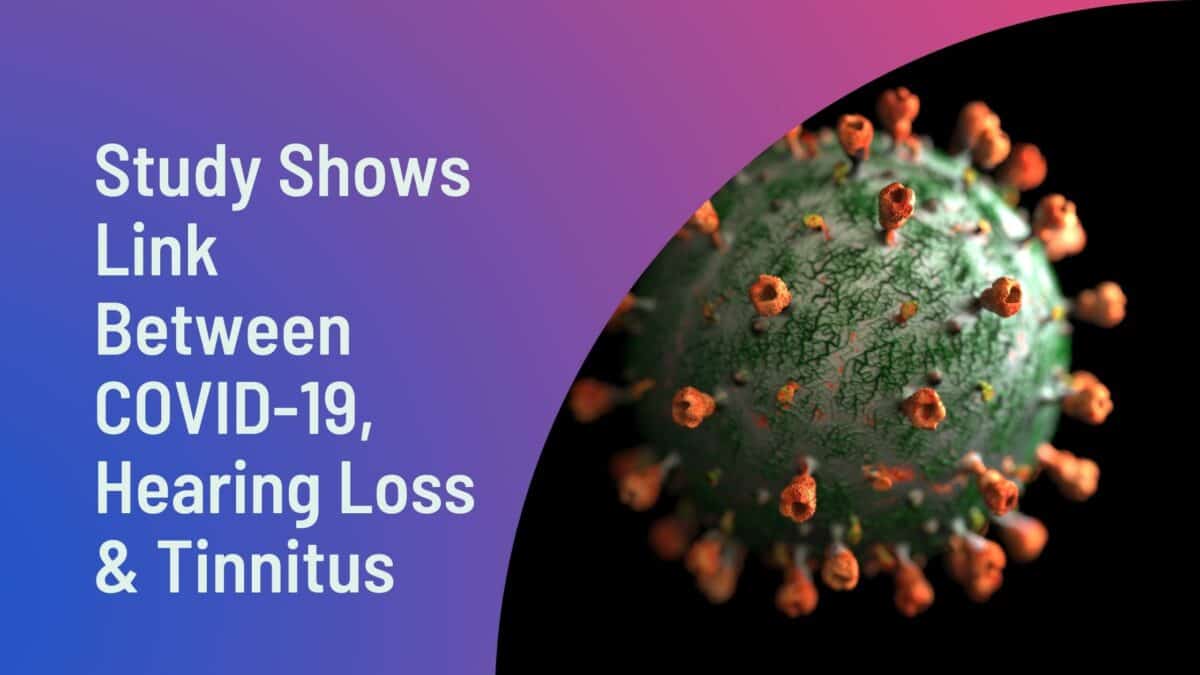As people continue to experience COVID-19, more research reveals its longer lasting impact on health. Studies show that hearing loss as well as tinnitus can be symptoms of long COVID which refers to symptoms that are experienced after the infection has cleared. Earlier studies evaluating COVID-19 symptoms highlighted its potential impact on the audio-vestibular system – the sensory systems for hearing and balance. Now, further along into the pandemic, more research shows a stronger correlation between COVID-19, hearing loss, and tinnitus.
Understanding Hearing Loss & Tinnitus
Hearing loss is one of the most common conditions that people experience today. Impacting over 48 million people, hearing loss is a pervasive medical condition that reduces an individual’s capacity to absorb and process sound. There are numerous factors that can cause this including exposure to loud noise, aging, existing medical conditions, as well as chronic ear infections. Hearing loss most typically occurs as a result of hair cells in the inner ear being damaged. These sensory cells send critical sound information to the brain which is then able to assign meaning to sound signals, allowing us to understand what we hear. When these hair cells are desensitized and damaged, this prevents them from performing their essential functions, resulting in permanent hearing loss.
Hearing loss produces numerous symtsmo that make it challenging to hear, including tinnitus. The Hearing Health Foundation estimates that 90% of all tinnitus that people experience occur with an underlying health condition of hearing loss. Tinnitus is the perception of hearing a buzzing or ringing noise in one or both ears when there actually is no noise in the external environment. This phantom like noise can be experienced mildly to profoundly, taking a toll on sleep and concentration. According to the Centers for Disease Control and Prevention (CDC), 50 million people experience tinnitus and 20 million people live with chronic tinnitus.
Another source of hearing loss as well as tinnitus is viral infections. Viruses can cause inflammation and this swelling can affect components in the inner ear that are critical for processing sound. Viruses can also contribute to bacterial (or fungal) infection that also produce hearing loss and tinnitus. Recent studies show that the COVID-19 virus can also cause these symptoms.
Link Between COVID-19, Hearing Loss, & Tinnitus
Developing research explores the multifaceted and long term impact of COVID-19. This includes studies that focus on the impact of COVID-19 on hearing health. These recent studies show that hearing loss and tinnitus can be symptoms of long COVID. A few significant studies include the following:
- 2020 Study Published in Frontiers in Public Health: this study involved 3,103 participants from 48 countries. The majority of people had pre-existing tinnitus and a small number of participants did not. Researchers found that 40% of people who experienced COVID-19 also experienced worsened tinnitus. A small number of participants reported experiencing tinnitus for the first time alongside or after COVID-19. Researchers concluded that these findings reveal a significant correlation between COVID and tinnitus.
- 2021 Study Published in International Journal of Audiology: researchers at the University of Manchester also evaluated the link between COVID, hearing loss, and tinnitus. Their study collected and analyzed data on the virus’s impact on the auditory system. This data was provided by 56 studies and researchers found that the prevalence of hearing loss was 7.6%, tinnitus was nearly 15%, and vertigo was 7.2% among people who experienced COVID-19.
These studies highlight that COVID-19 can impact the auditory system in ways that produce hearing loss as well as tinnitus. Researchers suggest that COVID-19 can damage the sensory cells and nerves that carry sound information to the brain.
Treating Hearing Loss
If you experience tinnitus, it is important to have your hearing assessed, especially if you have also dealt with COVID-19. Hearing tests are a painless and noninvasive way of measuring your hearing capacity in both ears. This establishes aany hearing loss and the degree of impairment present in each ear. Once your hearing needs are established, your hearing healthcare specialist is able to recommend an effective treatment option that meets those needs.
Contact us today to schedule an appointment for a hearing consultation. Treating hearing loss can transform your hearing health and daily quality of life.

